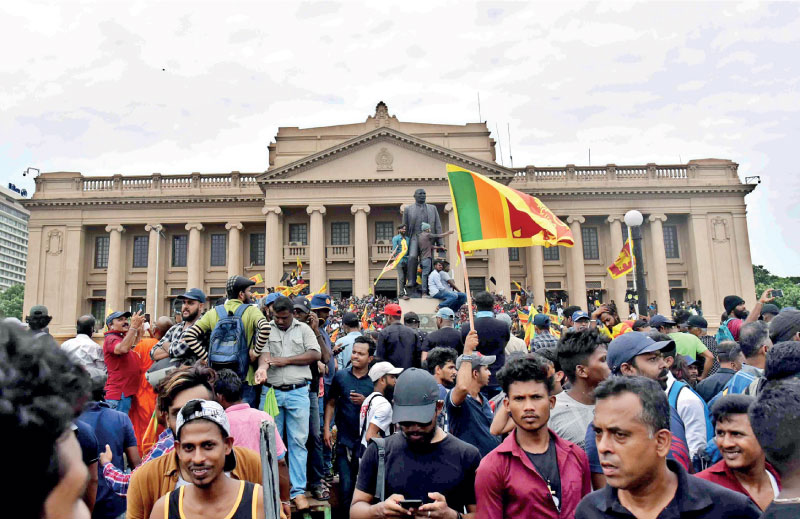Monday Feb 16, 2026
Monday Feb 16, 2026
Monday, 10 April 2023 01:29 - - {{hitsCtrl.values.hits}}

It’s fast becoming a battle of The People vs. the ATA, around which economic grievances may unify, perhaps leading to the predicted Aragalaya 2.0
 The Anti-Terrorism Act with its controversial set of provisions including the exceedingly broad spectrum of activities which could be construed as ‘terrorist’/‘terrorism’, reflects the true face of this Government.
The Anti-Terrorism Act with its controversial set of provisions including the exceedingly broad spectrum of activities which could be construed as ‘terrorist’/‘terrorism’, reflects the true face of this Government.
Minister Wijeyadasa Rajapakshe who is due to present this Bill in Parliament is reported to have said that if one doesn’t hope to become a terrorist, there’s no need to oppose this Bill. His actual words as reported are: “If a certain person does not have a hope to become a terrorist, there is no need to oppose this Bill. Terrorism is terrorism and there is no difference in its magnitude…” (Anti-Terror Bill tabling postponed to May | The Morning).
The Minister’s implicit definition of someone who opposes the Bill as an aspirant or potential terrorist, while non-opposition to the Bill is a certificate of absence of terrorist impulses, is a perfect example of how the Act’s loosely drafted provisions may be chronically abused in the future.
If a former Minister of Justice has been reduced to articulating such atrocious absurdities, there is little hope that sense will prevail by the time it is presented to Parliament in May. Members of the Opposition who hope to oppose the Bill in Parliament already qualify for designation as “hoping to become” terrorists by that very act of opposing the Bill.
Given the elastic definition in the draft Bill, where the “offense of terrorism” constitutes an “act or an illegal omission” which includes “causing serious damage to any place of public use, a State or governmental facility” with the intention of “wrongfully or unlawfully compelling the Government of Sri Lanka…to do or to abstain from doing any act”, the potential for the proliferation of “terrorism” is alarming.
Terrorist libraries
Consider the following provisions in the draft Bill:
(1), a “terrorist publication” is a publication to be understood by some or all of the persons to whom it is or may be available–
(a) as direct or indirect encouragement or other inducement to them to commit or, to prepare for, the offence of terrorism;
or (b) that the matter contained therein is useful in the commission of, or preparation for, the offence of terrorism.
(4) For the purposes of subsection (3), a “matter” includes every matter–
(a) which glorifies the commission of the offence of terrorism or preparation for the offence of terrorism;
and (b) from which the public may reasonably be expected to infer that what is being glorified is being glorified as conduct that should be emulated by them in existing circumstances.
Since the Act specifies “matter” as including “every matter” without distinction as to past, present or future publications, under such a law, the possession of the accounts of great revolutions that have inspired generations to fight for their freedoms, such as the American War of Independence, the French Revolution, the Russian Revolution, The Long March of Mao, the story of the Cuban Revolution, the life story of Nelson Mandela, the wars fought all over the globe for national liberation, all of which changed world history in a progressive direction, could be “matter” which could be “emulated in the existing circumstances”, because they certainly celebrate the spirit of popular, democratic or national resistance. Even scholarly or journalistic accounts of the Aragalaya could be construed as falling into this category.
All of those stories of historic leaps in public consciousness contained within them as a necessary precondition, the need to “compel” their respective governments to “do or abstain from doing any act” which sometimes included damage to public property, given the intransigence of the said governments.
So which publishing house and which university library (or even private library) would be safe from “terrorist associated activity” or even “terrorist offenses” under such a legal regime? Would the local press be constrained from publishing any material such as journalistic reports of activity by the youth resisting the Myanmar junta or Israeli Occupation, on the grounds that the said report “glorifies the commission of the offence of terrorism”?
Which foreign news, features or review of movies about Uruguay’s ex-President Mujica or incidents in the ANC’s struggle against apartheid currently streaming on Netflix, could be construed as those which may be used as “preparation” for some activity which could cause damage to public property in the course of “compelling the government to desist from continuing with an act”?
In the light of austerity measures that seem to be at the planning stage on top of repressive measures, an effort to prevent the Government from further eroding democratic freedoms probably encompassing so-called terrorist publications is a clear and present likelihood. The ATA could create an atmosphere in which such an effort could be regarded as tantamount to terrorism. Would such a state of affairs be devoid of consequences which repression alone could control?
Silence of the international community
Wijeyadasa Rajapakshe, in the same interview is reported as saying that there is “no opposition to this Bill internationally as of now.” It is unlikely that this silence will continue. In 2023, the United Nations Special Rapporteur on ‘the promotion and protection of human rights and fundamental freedoms while countering terrorism’ is expected to produce the first independent global study on the impact of counter-terrorism measures on civil society and civic space. An earlier report says that 66% of the Rapporteur’s communications with states as of 2018 have been “related to the misuse of a counter-terrorism measure against civil society”.
Reporting in 2019, the expert says that this is neither new, nor are they isolated incidents: “…targeting of civil society is not a random or incidental aspect of counter-terrorism law and practice. It suggests the hard-wiring of misuse into counter-terrorism measures taken by States around the globe.” (A/HRC/40/52)
She echoes our urgent concern regarding the lack of an acceptable definition of terrorism. In her response to delegates at an interactive event at the UN General Assembly’s Third Committee in October 2022 she confirmed that that “the misuse of legislation is directly related to the lack of a set definition of terrorism” and warns that “until precise definitions linked to acts of terrorism are adopted, misuse will continue.” In her advice to the international community the Special Rapporteur says that if human rights, international humanitarian, and refugee law, is disregarded in counter-terrorism, “it may undermine the United Nations Charter itself.”
(https://www.un.org/securitycouncil/ctc/news)
Could the ATA detonate Aragalaya 2.0?
Contrary to what the Government may have expected, the Bill has been widely and continuously criticised by political parties, civil society, academics, activists and journalists, immediately after its publication in gazette form. The Catholic Church of Sri Lanka, the institution most affected by the last act of actual terrorism, the Easter 2019 massacre, has made a strong statement against the ATA. The Human Rights Commission has joined them, publishing a statement. The International Commission of Jurists and Human Rights Watch have also issued statements denouncing the Act.
The Act is being debated in many settings on mainstream media and social media, with experts pointing out the multiple shortcomings which could be abused by any authority with a repressive turn of mind. The clearer it becomes through these discussions that this piece of proposed legislation has not been drafted in the public interest, and/or drafted carelessly, the more suspicious people become of its intent.
It has never been easy anywhere in the world to implement IMF conditionalities and repression has been part of the procedure. However, the President and his Government have a much more ambitious program for Sri Lanka, which experts have said goes beyond that of the IMF. During Aragalaya 1.0, several members of parliament loyal to the Gotabaya administration were victims of arson as emotions ran high after an assault on Gotagogama. The expansive ATA may well be a response of the Government to fears in this context of escalating economic hardships for the vast majority of citizens, rather than an objective assessment of the necessity for such legislation for the protection of the people as regularly claimed.
The people for their part, after their massive collective heave last year against the ruler of the day which managed to evict him from power, are still looking at a parliament which looks remarkably like the one they railed against, except for the head of state they didn’t elect.
This combination has already postponed elections, engaged in the deployment of disproportionate numbers of police personnel to prevent any sign of protests, and are now plotting to bring in harshly repressive legislation in the name of counter-terrorism.
The political context is one in which mainstream and social media are reporting that several members of the Opposition are hoping to join the Government, citing love of country and opportunity to contribute to economic recovery, never mind its authoritarian profile.
A section of the corporate sector seems enamoured by the securing of the IMF loan which they hope will catalyse other loans and investments. They were similarly enamoured of the previous President’s promised land, complete with Hitler comparisons for added measure. They forgot to assess the tipping point of people’s patience.
This time, both politicians in government, those hoping to join the government from the opposition, and others feeling secure in the President’s economic genius and his ability to disperse protesters, may be in a state of expectation of great things to come, especially with the ATA in place. Would a deeper analysis show things moving inexorably in the opposite direction?
There is already a question being posed about GSP plus, with its economic consequences. Would there be other similar setbacks for economic recovery as people’s discontent is included in the calculous of a safe place to invest?
There are already voices emerging from some politicians, experts and civil society including former President Chandrika Bandaranaike, warning against the adoption of the anti-terror Bill. The people’s spirit of resistance represented in the Aragalaya which waned after the resignation of former President Gotabaya Rajapaksa, is being rekindled on the streets and may consolidate as more groups in danger from being designated as terrorists (trade unions, student associations, social media activists) are coming together to stand against it. It’s fast becoming a battle of The People vs. the ATA, around which economic grievances may unify, perhaps leading to the predicted Aragalaya 2.0. It may not be anything like the first one.